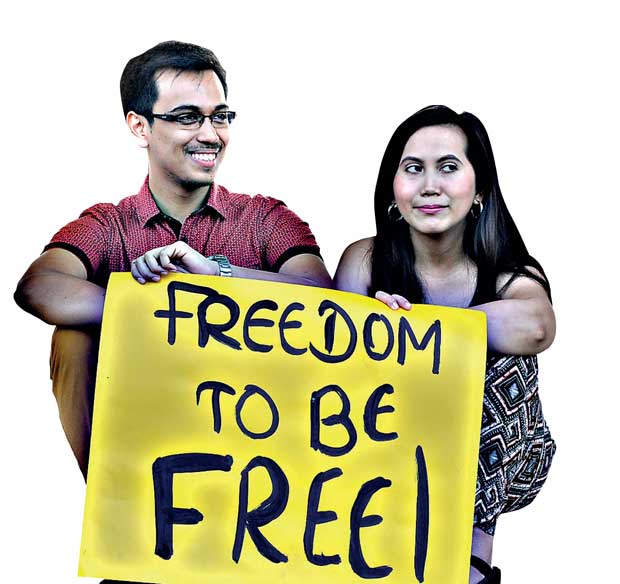Reply To:
Name - Reply Comment
Last Updated : 2024-04-25 17:36:00


In a cynical analysis of a recent protest at the Independence Square, Hafeel Farisz dubbed the protesters involved as “coffee shop liberals”. He certainly didn’t mean this as a compliment. He was not referring to the influence that coffee houses had on the Enlightenment or the liberals who ushered in the age of critical thinking on individual rights and duties of citizens. Instead, he meant this as a criticism, referring to people who gathered together in “up-market coffee lounges” to whip themselves into a fervour over first-world problems, while sipping their double-mocha Frappuccinos. He calls these protesters hypocrites for two reasons. First, they practice what they preach only when the offence takes place close to home. Second, they have a remarkable ability to manage cognitive dissonance: for instance, expressing outrage over the meaning of “rape” while ignoring the abuse suffered by women both at home and abroad. But his critique opens a broader question, why do coffee shop liberals care at all?
We are all born with a natural sense of altruism that drives us to care for those in our closest circles: family and friends. According to Peter Singer, a moral philosopher, we are capable of expanding our moral circles over time. In his book, The Expanding Circle, he points out that while our ancestors’ idea of community ended at the boarder of their village, many of us think of ourselves as part of a global community. Why did this change happen? According to Singer, this was because of technology and communication that allows us to actually affect the lives of others outside our immediate circles. We see the plight of refugees at home and abroad in vivid detail and sometimes even in real-time. Our ability to perceive suffering elsewhere is often matched by our ability to mobilise ourselves into action - donating to a cause, petitioning governments, or simply raising more awareness. One only needs to remember the outpouring of global aid that followed the devastating Tsunami in 2004, some of which was surely planned at a Starbucks somewhere in the world. Understanding why “coffee shop liberals” care to all, may help us to create a more caring society.
The size of our moral circles and the motive to care for strangers, depends on our ability to perceive and empathise with them. This brings me to Farisz’s first general critique: the hypocrisy of coffee shop liberals. In my reading of his criticism, he’s not annoyed with these people for caring about others; instead, he’s criticising them for not caring enough about others outside their broadest circle, which happens to end with Colombo. He argues that “self-interest” is the only reason these people have mobilised against something too close to home. But self-interest implies a degree of selfishness.The protesters, however, were coming together through a sense of community, albeit a Colombo-centric one. As Singer argues, a sense of community requires a degree of altruism.
In hindsight, the fact that protests over this particular issue happened in Colombo and not some other city shouldn’t be surprising. Colombo is the most socially and economically diverse city in the country and together with the rest of the Western Province, accounts for about half the country’s GDP. The city, for better or worse, is the best place for those looking for social mobility and economic opportunity. Moreover, people in Colombo are better connected to each other because of excellent (and relatively cheap) access to the internet and constant access to social media. Hence, the sense of community in Colombo is deeper and broader than any other place in the country. Note that a sense community isn’t unique to Colombo; other villages, town and cities in the island have mobilised over their own local issues because of their sense of community. Furthermore, the deeper and broader sense of community in diverse cities may also explain why cities generally report less racism than rural areas. It is because cities expose people to other groups and makes it easier to empathise with those people. Colombo is one of the few places in the country where someone can experience every other culture in a non-threatening manner: from commerce and cuisine to the same seat on a bus or train.
Farisz’s second criticism is more intriguing. He quite correctly points out to the powerful degree of cognitive dissonance amongst those who identify themselves as liberals. He correctly points out to the plight of maids in Sri Lanka. At home, he’s specifically referring to women from Indian Tamil communities who live marginalised lives with a variety of social problems and often find work in Colombo as maids. For maids in general, a decent wage and living conditions depends entirely on the discretion of their employers. He also refers to women from rural areas, who are often forced to work abroad as maids, especially the Middle East. The abuse some of these women have endured - horror stories include slavery, assault, rape, and even death - have made the headlines multiple times but hardly gets the sort of vocal attention such a problem deserves.
Again, our insights into social psychology may give us an answer. Disappointingly, the problem of low-skilled labour and our social attitudes towards servants, are complicated and difficult to solve. Dan Aerially, in his book, Predictably Irrational, argues that when problems are complicated or require deep moral reasoning, people often choose to leave things in their present state. A second reason maybe that since maids often introduced and interact with their employers within a social hierarchy, it is difficult to empathise. Empathy works best when people are of equal status, but to improve the status of maids, a systematic socio-economic solution is necessary. Nevertheless, we have an obligation to use our understanding of these criticisms to expand our collective sense of community outside of Colombo and enhance the rights of our fellow citizens.
Our immediate priority is to increase our sense of community outside our villages or cities. This means we should be better exposed to people outside our immediate moral circles. A detailed list of solutions is outside the purview of this article but the following are a few ideas in no particular order. First, Sri Lanka needs institutions that allow people to actually interact with others from different walks of life in a neutral setting: civil society, community groups, volunteer organisations, etc.
Second, it is important to reduce the disparities in income and wealth that create such stark cleavages between the privileged Colombo folk and rural communities. This can be achieved through a variety of income redistributive measures, greater investment in public goods – education, health, nutrition, access to the internet - and more incentives for business to spread outside Colombo. Finally, it is important for the media to actually increase the visibility of other communities in Sri Lanka. It is tragically easier for me to feel the pain of protesters in Ferguson or Syrian refugees in Europe, than people living in my own country. Ultimately, an inclusive society needs liberals and the values they represent. By narrowly defining our moral circles, however, we do injustice to those values. It is time we held ourselves to higher standards expand our moral circles.

Add comment
Comments will be edited (grammar, spelling and slang) and authorized at the discretion of Daily Mirror online. The website also has the right not to publish selected comments.
Reply To:
Name - Reply Comment
US authorities are currently reviewing the manifest of every cargo aboard MV
On March 26, a couple arriving from Thailand was arrested with 88 live animal
According to villagers from Naula-Moragolla out of 105 families 80 can afford
Is the situation in Sri Lanka so grim that locals harbour hope that they coul